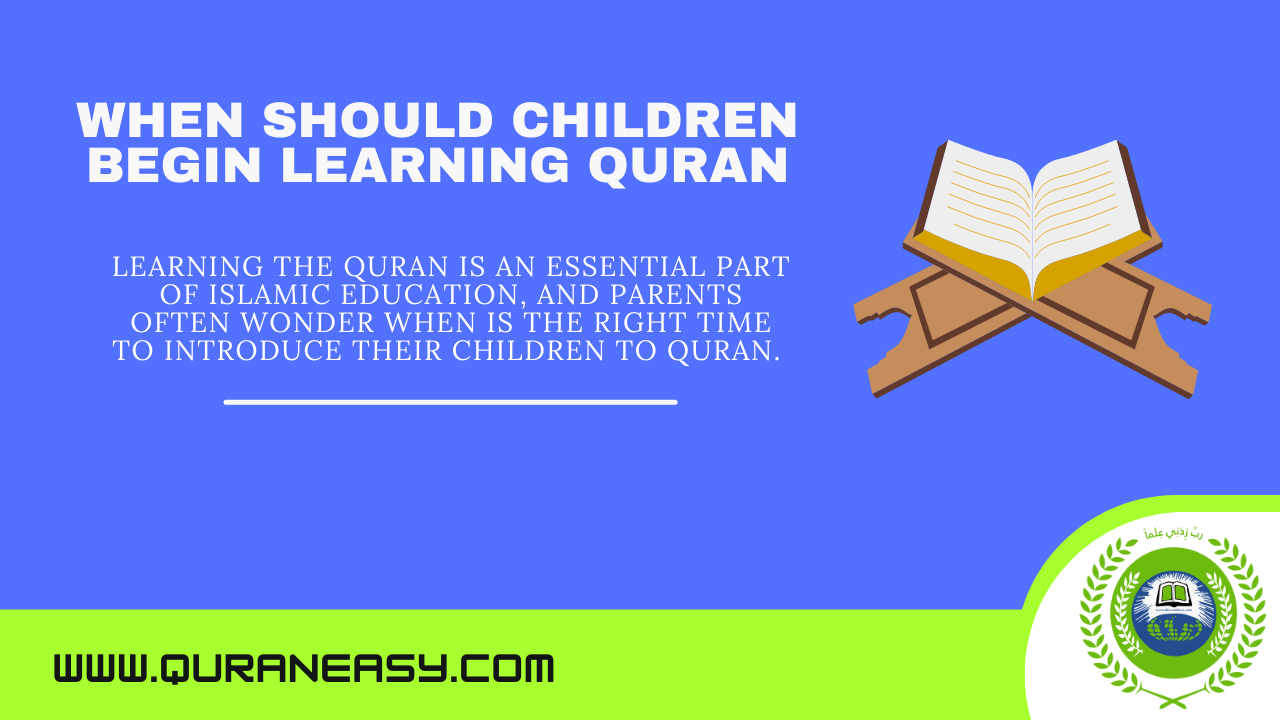Learning the Quran is an essential part of Islamic education, and parents often wonder when is the right time to introduce their children to Quran. The decision to begin Quranic education is crucial, as it should align with the child’s developmental readiness and create a strong foundation for their spiritual growth. In this article, we will explore the factors that determine when children should begin learning the Quran and how parents can support their journey.
Importance of Quranic education for children
The Quran is considered the word of Allah (God) and holds significant importance in the lives of Muslims. It is a guide for leading a righteous and fulfilling life. By introducing children to the Quran at an early age, they can develop a deep connection with their faith and instill moral values that will shape their character. Quranic education not only imparts religious knowledge but also encourages personal growth, empathy, and ethical conduct.
Psychological readiness for Quranic education
Before embarking on Quranic education, it is essential to consider the child’s psychological readiness. Children should have a basic understanding of the concept of God and possess foundational moral and ethical values. Additionally, they should demonstrate the ability to concentrate and focus for short periods, as Quranic learning requires attentiveness.
Physical readiness for Quranic education
Physical readiness plays a crucial role in Quranic education. Children should have developed motor skills that allow them to hold and handle a Quran with ease. Speech and language skills are also vital for understanding the Arabic text and reciting verses correctly. Furthermore, fine motor skills are necessary for writing Arabic letters and words as they progress in their Quranic studies.
Social readiness for Quranic education
A child’s social readiness determines their ability to engage in a structured Quranic learning environment. They should be comfortable interacting with peers, following instructions from teachers, and demonstrating respect for authority. These social skills contribute to a positive and collaborative learning atmosphere.
Emotional readiness for Quranic education
Emotional readiness is crucial for a child’s success in Quranic education. They should exhibit emotional stability, as learning can sometimes be challenging and require patience and perseverance. A love for learning and a genuine interest in understanding and practicing the teachings of the Quran are indicators of emotional readiness.
Age-appropriate methods for teaching Quran to children
To make Quranic education engaging and enjoyable for children, age-appropriate teaching methods should be employed. Rhymes, songs, and chants can help introduce the Arabic alphabet and basic Quranic phrases. Visual aids and illustrations aid comprehension and memory retention. Storytelling and interactive lessons bring the Quranic stories and lessons to life, fostering a deeper understanding.
Benefits of starting Quranic education for kids early
Starting Quranic education early offers numerous benefits. It provides kids with a strong foundation in faith, enabling them to develop a lifelong relationship with the Quran. Early exposure to Arabic through Quranic education facilitates language acquisition and enhances cognitive development. Moreover, Quranic education imparts moral and ethical values that shape the child’s character.
Balancing Quranic education with other aspects of childhood
While Quranic education is important, it should be balanced with other aspects of childhood. Play and recreation are vital for a child’s overall development and should be encouraged alongside Quranic studies. Academic and secular education should also receive due attention to ensure a well-rounded education. Additionally, family and social interactions play a crucial role in a child’s growth and should not be neglected.
Challenges and solutions for teaching Quran to children
Teaching the Quran to children can pose challenges such as limited attention spans, language barriers, and a shortage of qualified teachers and resources. However, these challenges can be overcome with effective strategies. Breaking lessons into shorter durations, incorporating interactive activities, and using engaging resources can help sustain a child’s interest. Language barriers can be addressed by providing translations and explanations in the child’s native language. Connecting with qualified Quran tutors and utilizing online resources can also enhance the learning experience.
Parental involvement and support
Parental involvement and support are essential for a child’s success in Quranic education. Creating a Quranic learning environment at home, such as having a designated area for Quranic studies and displaying verses and reminders, can foster a sense of importance and reverence for the Quran. Encouraging regular practice and revision through small rewards and recognition helps establish a consistent learning routine. Seeking guidance from scholars and educators ensures that parents are equipped with the necessary knowledge and resources to support their child’s Quranic journey.
Conclusion
Determining when children should begin learning the Quran requires considering their psychological, physical, social, and emotional readiness. Starting Quranic education early offers numerous benefits, but it should be balanced with other aspects of childhood. Challenges in teaching the Quran to children can be overcome with effective strategies, and parental involvement plays a crucial role in supporting a child’s Quranic journey. By nurturing a love for the Quran and providing a conducive learning environment, parents can help their children embark on a lifelong journey of spiritual growth and knowledge.
FAQs
Q 1: Can children learn the Quran even if they don’t understand Arabic?
Yes, children can learn the Quran even if they don’t understand Arabic. Initially, they may focus on reciting and memorizing the Arabic text. As they progress, parents and teachers can provide translations and explanations of the verses to facilitate comprehension and understanding.
Q 2: Is it necessary to send children to a Quranic school?
Sending children to a Quranic school is not mandatory. Quranic education can be imparted through various means, including homeschooling or community-based programs. The decision depends on factors such as the availability of qualified teachers, resources, and the preference of the parents. What matters most is providing a structured and supportive learning environment for children to study the Quran effectively.
Q 3: What if my child shows resistance to Quranic education?
If a child shows resistance to Quranic education, it is important to approach the situation with understanding and patience. Resistance may stem from various factors such as lack of interest, difficulty in understanding, or negative associations. To address this, parents can try the following:
- Communicate openly: Talk to your child to understand their concerns and reasons for resistance. Listen attentively and empathetically to their perspective.
- Find alternative approaches: Explore different teaching methods or resources that cater to your child’s learning style and interests. For example, incorporating technology, interactive apps, or educational games can make learning the Quran more engaging.
- Seek guidance: Consult with scholars, educators, or experienced individuals who can provide guidance on effective strategies to motivate and engage children in Quranic education.
- Lead by example: Show your child your own love and dedication to the Quran. Let them witness your own devotion and practice, as it can inspire and influence them positively.
- Make it relatable: Connect the teachings of the Quran to real-life examples and situations that your child can relate to. This can help them see the practicality and relevance of the Quran in their daily lives.
Remember, each child is unique, and it may take time for them to develop an appreciation for Quranic education. Patience, consistency, and a supportive environment can make a significant difference in their attitude towards learning the Quran.
Q 4: How can I make Quranic learning enjoyable for my child?
Making Quranic learning enjoyable is key to engaging children and nurturing their love for the Quran. Here are some tips:
- Incorporate creativity: Use creative and interactive methods such as crafts, coloring, and role-playing to teach Quranic concepts and stories.
- Make it a family affair: Involve the whole family in Quranic learning and with online Quran classes for kids. Organize regular family gatherings to recite and discuss verses, share reflections, and engage in Quranic-themed activities.
- Utilize multimedia resources: Explore educational videos, audio recitations, and online platforms that provide interactive and child-friendly content for learning the Quran.
- Introduce rewards and incentives: Offer small rewards, praise, and recognition to motivate and celebrate your child’s progress in Quranic education. This can create a positive association with learning.
- Foster a supportive environment: Create a peaceful and dedicated space for Quranic studies at home. Eliminate distractions and ensure a calm atmosphere that allows your child to focus and connect with the teachings of the Quran.
Remember, the goal is to create a balance between providing a structured learning experience and making it enjoyable for your child. By incorporating fun and interactive elements, you can foster a positive and lifelong relationship between your child and the Quran.
Q 5: How can I assess my child’s progress in Quranic education?
Assessing your child’s progress in Quranic education is important to ensure their growth and identify areas that need improvement. Here are some ways to assess their progress:
- Recitation and memorization: Monitor your child’s ability to recite Quranic verses accurately and fluently. Keep track of their memorization progress and celebrate milestones.
- Comprehension and understanding: Engage in discussions with your child about the meanings and lessons within the Quranic verses they have learned. Assess their comprehension by asking questions or having them explain the concepts in their own words.
- Application in daily life: Observe how your child applies the teachings of the Quran in their behavior and interactions. Assess their ability to reflect and implement the moral and ethical values learned from the Quran.
- Performance in learning activities: Evaluate your child’s participation and performance in learning activities, such as completing assignments, quizzes, or projects related to Quranic education.
- Feedback from teachers or mentors: Communicate regularly with your child’s Quranic teachers or mentors to gain insights into their progress, strengths, and areas for improvement.
Remember, the purpose of assessment is not only to evaluate your child’s academic progress but also to provide support and guidance for their continuous development in Quranic education. Celebrate their achievements, address any challenges, and provide constructive feedback to nurture their growth.
By considering these FAQs and understanding the factors that determine when children should begin learning the Quran, parents can make informed decisions and provide the necessary support for their child’s Quranic journey. With a nurturing and engaging approach, children can develop a strong foundation in their faith and embark on a lifelong path of spiritual growth and knowledge.





Leave A Comment